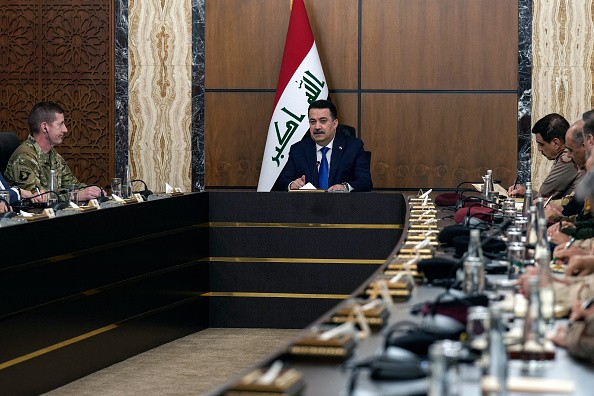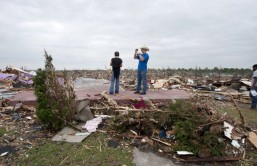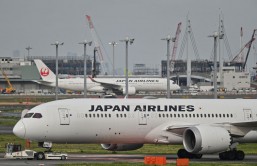Iraq's foreign ministry announced that Baghdad and Washington have agreed to hold negotiations on the future of the US-led military coalition in Iraq to determine a timeline for a phased withdrawal of troops and the coalition's end.
The US-led military coalition was established in 2014 to fight the Islamic State group, the year the jihadist group overran nearly a third of Iraq's territory and swathes of neighboring Syria.
Iraq, US Resume Talks
Iraqi Prime Minister Mohamed Shia al-Sudani chairs a meeting with top-ranking officials of the Iraqi armed forces and of the US-led coalition during the first round of talks on the future of American and other foreign troops in the country, in Baghdad on January 27, 2024. Baghdad expects discussions to lead to a timeline for reducing their presence. Roughly 2,500 US troops are still deployed in Iraq as part of the anti-Islamic State group coalition formed in 2014 -- the year the jihadist group overran swathes of Iraq and neighbouring Syria.
General Yehia Rasool, the military spokesman for Iraq's prime minister, said, "The supreme Iraqi military commission resumed its meetings with international coalition forces in Baghdad on Sunday."
Rasool noted that as long as nothing disrupts the serenity of their talks, the meetings will occur regularly to achieve the commission's works as soon as possible.
He said the discussions were intended to establish a "timeline" for a "progressive pullout" of coalition forces from Iraq, which would lead to the end of its mission. US and allied troops have been targeted more than 165 times in the Middle East since mid-October in attacks related to the Israel-Hamas war in Gaza.
The Islamic Resistance in Iraq, a loose coalition of Iran-backed groups enraged by US support for Israel, has claimed responsibility for most of the attacks. The US has retaliated with multiple deadly strikes targeting these groups.
Washington has 2,500 soldiers in Iraq and some 900 troops in Syria as part of the coalition against IS. Its forces in Iraq are deployed at the invitation of Baghdad, while those in Syria are stationed in areas outside Syrian government control. Currently, US Marines in Iraq support government forces in their efforts to stop IS militants from resurfacing.
In Sunday's statement, Rasool said that talks were now focusing on assessing the threat presented by IS, which has been defeated in Syria and Iraq but still has sleeper cells that carry attacks. He added that the talks were also centering on the capabilities of the Iraqi armed forces.
Iraqi authorities want to cooperate in bilateral military cooperation to contribute to the force that will replace the international coalition.
However, the procedure is likely to be extended. According to a coalition statement released on Thursday, the goal is "to assess" the progress accomplished in destroying the terrorists and "discuss the future transition" of the coalition's mission.
Read Also: Israel Discovers Hamas Command Tunnel Under UNRWA Gaza HQ
US Reprisals Against Iran-linked Groups Anger Iraq, Syria
The US, which threatened additional strikes, said that Iran-backed forces were responsible for the drone attack on a US base in Jordan on Sunday.
However, US forces refrained from attacking inside Iranian territory, with both Washington and Tehran eager to prevent a full-scale conflict. But with tensions already high due to the Israel-Hamas conflict in Gaza, both the Syrian and Iraqi governments joined Tehran in accusing Washington of threatening regional stability.
According to National Security Council spokesperson John Kirby, US aircraft struck "more than 85 targets at seven facilities," four in Syria and three in Iraq. He added that the targets were carefully selected to avoid civilian casualties.
Related Article: Iran Expresses Unwavering Support for Hezbollah Amid Rising Tensions, Confrontations With US Forces









